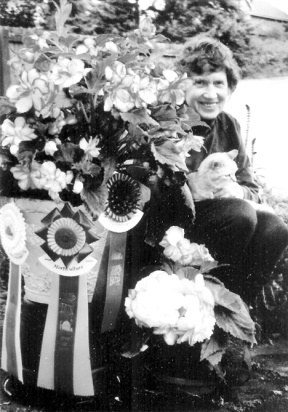Wilma O’Nan lay in a mainland hospital bed propped up by pillows unable to move due to a stroke, yet her heart and mind’s real essence breathes vibrancy into her immobile body.
When she was told by friend Linda Good of Island Strings that O’Nan was to be featured as a Hometown Hero, O’Nan was in her Brookhaven Langley apartment, feeling just fine on her way out the door to volunteer at the Methodist Church.
Life changed for O’Nan in the next week, however, after she was taken to a mainland hospital where a five-way bypass operation was performed on her. While recuperating from surgery, she suffered a stroke.
As she lays in her hospital bed, O’Nan’s speech is labored, yet her heart and mind are well aware and alive. Her South Whidbey daughter Cathi Bower and cousin Lilo are bedside as O’Nan talks.
A question comes up: “Why is there suffering in this world?”
O’Nan, without hesitation, says, “If we believe in a loving God, then I think suffering in the world has a purpose in order to develop compassion for others.”
“Mom has always showed compassion and nonjudgment to people and is a confidant for hundreds of people,” says Bower. “I think this might be why she’s had a heart bypass — she’s carrying so many intimate secrets and personal feelings for others.
“But then Mom wouldn’t have it any other way. I remember when I was growing up, mom was a coordinator for a national project called the ‘Box Project’ to many churches. The Box Project is where one family adopts another family (living in poverty) for a year and helps support them,” Bower continues. “Usually parishioners would send some money and needed items to their family. But mom didn’t stop there, she drove back to Mississippi to personally help her family. She helped Bessie and her 13 children plant their garden, tutored the kids in school work, and anything else she could see that would help this family help themselves.”
“Mom lives on less money than anyone I personally know of,” Cathi notes.
O’Nan quickly chips in: “I live just fine, Cathi. My car is my biggest expense, followed by my 20-year old cat, GC.”
She adds, “But lets not put this in the paper, hard to find a man on a small income.”
She arduously turns her lip slightly up, her eyes finish her rascally grin.
Many across Whidbey have been witness to O’Nan’s giving spirit.
Peter Bennett, a community volunteer comments, “Wilma is mentor for all of us that know her and are trying to live simply. She’s lived in several simple abodes, for several years she was perfectly happy living in a barley rehabbed chicken house, that you had to duck if you entered.
“Wilma is an example of unconditional love in action. She finds and supports the best in everyone—and never forgets anyone. She is an example of unconditional love in action.”
O’Nan would want nothing more than to go home right now.
“There is no other place anywhere that has the special people Whidbey does,” she says. “But I will accept where I am and do my best to be thankful.”
Her speech is labored and slow.
“There’s sure a lot of people suffering much worse than I in this world. When we can find a purpose in our suffering it’s a lot easier to tolerate or accept, and I intend to learn more compassion for others.”
She doesn’t take actions or in-actions from others personally. For instance, back in the mid 1970s when she lived in California, she read about the Chinook Center in Clinton and decided she would move there. After many months of writing Chinook and never hearing back, she wrote one more letter that simply said, “I am on my way and will be there on the 14th.”
Fritz and Vivienne Hull, founders of Chinook Whidbey Institute, recall it well.
“I remember she drove up in her Volkswagen with her goat riding in the passenger seat. Wilma got out of the car and said, ‘I think you need secretarial help.’ And she’s been here ever since.”
Maribeth Crandell, a community volunteer, said she didn’t know anyone when she moved here in 1978.
“I went to the Chinook grounds and walked around the towering evergreens, expansive fields and old orchards when a warm smiling woman greeted me with a loving welcome. She loves me as a friend and daughter, even though Wilma and actual daughter Cathi are as close as any mother and daughter could be,” Crandell notes.
Crandell spoke how O’Nan has been a wise counselor for her through a divorce and other difficult times in her life.
Crandell says, “Wilma has had her share of pain, divorce, fibromyalgia, breast cancer twice for example — yet each time she participates fully in her recoveries.”
Crandell says O’Nan shows us by example that looking for a purpose in our own sufferings makes it more tolerable.
As for pain and suffering in others? O’Nan says while we most likely cannot resolve the pain of others, what we can do is offer non-judgmental compassion during their time of suffering.


